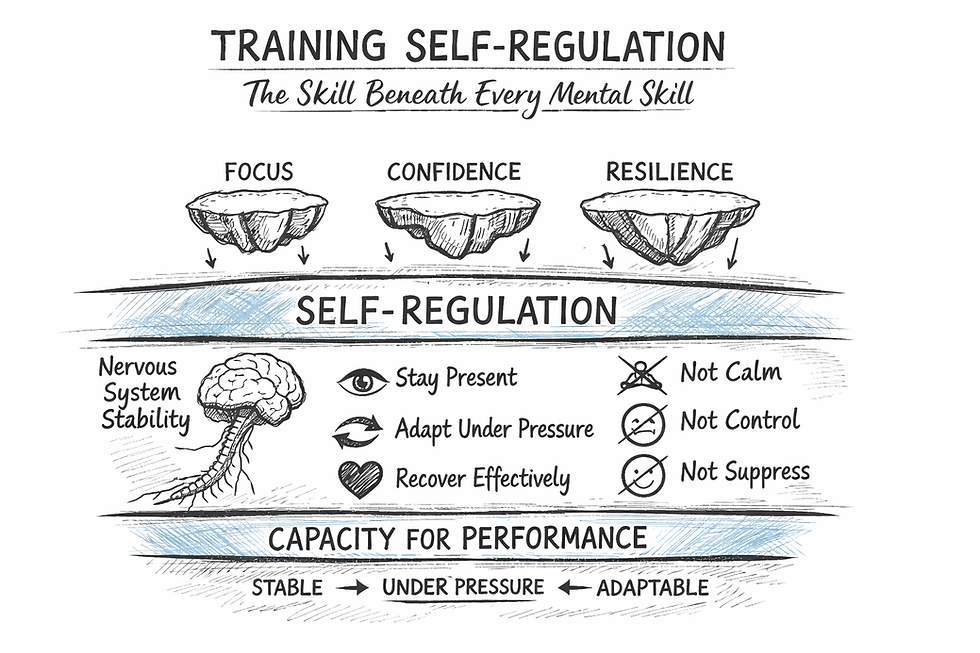Change the Film: Transforming Your Mental Game as an Athlete
- Kate Allgood
- Sep 24, 2024
- 4 min read
As an athlete, you pour your heart and soul into your sport. You train hard, put in the hours, and strive for excellence. Yet, despite your dedication, you can often find yourself frustrated by the decisions of coaches, teammates, or management. It’s easy to feel powerless when you want others to change—be it a coach’s strategy or a teammate’s attitude. However, what if the key to overcoming this frustration lies not in changing others, but in transforming ourselves?
In this post, we’ll explore the idea that by shifting your focus inward and changing your mindset, we can enhance your performance and overall experience in sports.
The Power of Perspective
The quote, "It is neither necessary nor possible to change others. But if you can change yourself, you'll find that no other change is needed," highlights a crucial truth. When faced with disappointment or frustration regarding external factors, we often overlook the most powerful tool at our disposal: our mindset.

1. Recognize What You Can Control
In sports, many aspects are outside your control—coaching decisions, game outcomes, or the performance of teammates. Focusing on these factors can lead to stress and frustration. Instead, concentrate on what you can control: your attitude, your effort, and your approach to challenges.
Action Step: Keep a journal to track your emotions and reactions. Reflect on how much energy you spend worrying about things beyond your control versus what you can influence.
2. Shift Your Mindset
Adopting a growth mindset can dramatically alter your perception of challenges. Instead of viewing setbacks as failures or reasons to blame others, see them as opportunities for growth. This shift in perspective allows you to take ownership of your journey.
Action Step: When you encounter a frustrating situation, ask yourself: “What can I learn from this? How can I improve moving forward?”
3. Embrace Self-Improvement
Instead of wishing for others to change, focus on enhancing your own skills and mental game. This self-improvement not only benefits you but can also positively influence those around you. Your dedication and resilience can inspire teammates and even shift the dynamic of your team.
Action Step: Set personal goals related to your training, technique, or mental toughness. Celebrate small wins that contribute to your overall growth.
Changing the “Film”
Imagine your mind as a cinema screen, displaying the film of your experiences. When you change the film—your thoughts, beliefs, and attitudes—you transform the picture entirely.
1. Visualize Success
Visual imagery is a powerful technique used by elite athletes to enhance performance. By visualizing your ideal responses to challenging situations, you can program your mind for success.
Action Step: Spend time each week visualizing yourself handling difficult situations with grace and confidence, whether it’s a challenging opponent or a critical game moment.
2. Build Resilience
Building mental resilience is essential for navigating the ups and downs of athletics. Develop coping strategies to manage stress and setbacks, and remind yourself that every athlete faces challenges.
Action Step: Practice mindfulness or meditation to develop greater awareness and control over your thoughts and emotions.
Conclusion: Empower Yourself
Ultimately, the journey of an athlete is deeply personal. While you may not have the power to change coaches or teammates, you have the incredible ability to change yourself. By focusing on your own growth and mindset, you’ll not only find greater fulfillment in your sport but also inspire those around you.
Remember, you’re the director of your own film. Change the narrative, and you might just find that the frustrations you once felt begin to fade away, replaced by a renewed passion and focus on what truly matters: your own performance and potential.
Embrace this journey of self-discovery, and watch how it transforms not only your athletic performance but your entire experience in the world of sports.
Own your focus. Own your game
Kate
About: Kate Allgood is educated in the field of applied sport psychology. She holds two Masters degrees in psychology where she graduated with distinction. After a very successful hockey career, she has spent the past 14 years working one on one with high school, college, Olympic, and professional athletes to help them with their mindset, mental performance and mental skills training. Kate has also been a consultant for professional teams, including the Anaheim Ducks primary minor league affiliate the San Diego Gulls, to help the team and players develop their mental game. It is important to note that while Kate has graduate school training in applied sport psychology and general psychology, she does not diagnose or treat clinical disorders, and is not a licensed psychologist.
**The information provided is not to dispense medical advice or prescribe the use of any technique, either directly or indirectly, as a form of treatment for physical, emotional, or medical problems, without the advice of a physician. The information provided is only to offer information of a general nature to help you in your quest for high performance. If you know or suspect you have a health problem, it is recommended you seek your physician's advice.



Comments